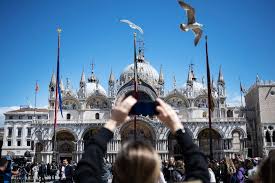Economic Impact of Tourist Departure on Majorca
Majorca’s vibrant hospitality industry has faced significant setbacks as a result of a sharp decline in tourist arrivals, particularly from the United Kingdom, traditionally one of its main markets. Restaurants and bars have reported a devastatingly slow season after many families chose alternate destinations following a wave of anti-tourist protests on the island. This shift in tourist flows has had a ripple effect on local businesses that rely heavily on seasonal visitors’ spending.
The Immediate Consequences for Hospitality Businesses
Local operators, especially in the food and beverage sector, have expressed concern over the sudden loss of revenue. This downturn not only impacts direct income but also employment opportunities for seasonal workers, many of whom depend on tourist seasons for their livelihoods. The withdrawal of UK families has underscored just how vulnerable destination economies can be when they face negative sentiment among their key visitor demographics.
Sectoral Impact Overview
| Sector | Reported Impact |
|---|---|
| Restaurace a bary | Sharp decline in seasonal income; lower customer volumes |
| Hospitals and accommodation | Increased vacancy rates; lower bookings |
| Local retail and services | Reduced spending linked to fewer tourists |
| Employment | Seasonal job losses and reduced part-time opportunities |
A Brief Historical Perspective on Majorca’s Tourism
The Balearic Islands, with Majorca as a flagship destination, have long been emblematic of Mediterranean tourism, attracting millions with their sun-drenched beaches, clear waters, and charming marinas. The island’s economy has historically leaned heavily on this influx, with tourism accounting for a substantial portion of its GDP and local employment.
Historically, the development of Majorca’s tourism sector followed the classic tourism area life cycle, progressing from discovery and development through to consolidation. These stages brought infrastructure growth, including hotels, local ports supporting yachting and boating activities, and leisure facilities that catered to a broad spectrum of visitors.
Despite its success, the island has faced challenges typical of many mature destinations, from environmental pressures like water resource competition between agriculture and tourism to social tensions arising from high visitor densities in peak season. The recent protests and their consequences can be viewed within this broader pattern of the destination lifecycle, where local sentiments and sustainability considerations increasingly influence visitor dynamics.
Širší význam pro mezinárodní cestovní ruch
Majorca’s experience serves as a cautionary tale for popular tourist hubs around the world. Destinations that rely heavily on specific source markets or mass tourism can find themselves exposed to sudden shifts in travel preferences or social attitudes. Sustainable tourism practices and community-inclusive planning become vital to maintaining a welcoming environment for visitors while preserving the local economy and culture.
International tourism trends suggest a growing awareness among travelers about the sociocultural impacts of their visits. Travelers are increasingly inclined to avoid destinations experiencing overt social tensions or negative publicity. This dynamic encourages destinations to innovate and focus on quality experiences like yacht charters, maritime activities, and sustainable offerings that balance economic benefits with community well-being.
Potential Pathways for Recovery and Resilience
- Diversification of Visitor Markets: Expanding promotional efforts beyond traditional markets to attract a wider range of tourists, including those interested in sailing, superyacht activities, and eco-friendly boating experiences.
- Investment in Soft Tourism: Focusing on lower-impact sustainable tourism that leverages local culture, nature, and water-based activities to provide authentic experiences.
- Community Engagement: Increasing local involvement in tourism planning to mitigate tensions and foster host-guest harmony, improving the overall visitor experience.
- Infrastructure Enhancement: Upgrading marinas, waterfront dining, and recreational boating facilities to appeal to affluent yachting clients and sailing enthusiasts.
Tourism Economic Impact Factors
Understanding the economic impact of tourism requires recognition of the multifaceted ripple effects from visitor expenditures. The initial spending by tourists fuels direct income for hotels, restaurants, boating charters, and related services. This income subsequently circulates through the local economy via suppliers, employment wages, and induced spending — often referred to as the multiplier effect.
| Impact Type | Popis |
|---|---|
| Direct Impact | Immediate spending on hospitality, accommodation, and marine activities |
| Indirect Impact | Spending by businesses to support tourism services (e.g., local suppliers) |
| Induced Impact | Further spending from incomes earned in tourism sectors within the local community |
Looking Ahead: Majorca in the Context of Marine Tourism
Given Majorca’s coastal character with its inviting beaches, clear waters, and established marina infrastructure, the decline in traditional tourism sources also opens an opportunity to emphasize its marine offerings. Charters of sailing yachts, boat rentals, and superyacht visits remain potent attractors for visitors seeking luxury and adventure on the Mediterranean Sea.
With thoughtful management, there is potential for Majorca to re-establish itself as a top-tier destination for yachting enthusiasts and water-based activities, which tend to foster longer stays and higher spending. Enhancements in marina facilities and integration of sustainable boating practices could reinforce the island’s position as a sought-after destination year-round, beyond just the conventional beach resort model.
Závěr
The recent downturn in tourist arrivals, particularly from UK families, has exposed economic vulnerabilities in Majorca’s hospitality sector. This scenario reflects broader challenges faced by mature Mediterranean destinations balancing local community interests, sustainable development, and economic vitality.
By adapting to changing visitor preferences and promoting diversified tourism including yacht charters, sailing activities, and marine experiences, Majorca can navigate through current difficulties and enhance its appeal. The island’s rich natural assets and strategic location in the Mediterranean Gulf remain its strongest assets for rediscovering growth.
GetBoat.com is an international marketplace for renting sailing boats and yachts, providing access to a wide range of options in destinations like Majorca. For those interested in exploring marine activities, yachting, or simply renting a boat to enjoy the sun-soaked seas, GetBoat.com offers the best service to suit different tastes and budgets, contributing to the sustainable tourism dynamics of coastal regions.

 Economic Setbacks Hit Majorca’s Hospitality Sector Following Tourist Departure">
Economic Setbacks Hit Majorca’s Hospitality Sector Following Tourist Departure">
